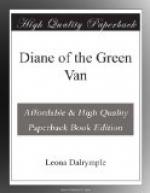Farmers waved and called; housewives looked and disapproved; children stared and jealous canines pettishly barked at the haughty Rex; but Johnny only chuckled and cracked his whip. Day by day the green and white caravan rumbled serenely on, camping by night in field and forest.
A country world of peace and sunshine—of droning bees and the nameless fragrance of summer fields it was! And the struggling nomads of the dusty road! Diane felt a kindred thrill of interest in each one of them. Now a Syrian peddler woman, squat and swarthy, bending heavily beneath her pack amid a flurry of dust from the sun-baked roads her feet had wearily padded for days; now a sleepy negro on a load of hay, an organ grinder with a chattering monkey or a clumsy bear, another sleepy negro with another load of hay, and a picturesque minstrel with an elaborate musical contrivance drawn by a horse. Now a capering Italian with a bagpipe, who danced grotesquely to his own piping, and piped the pennies out of rural pockets as if they had been so many copper rats from Hamelin!
Peddlers and tramps and agents, country drummers and country circuses, medicine men who shouted the versatile merits of corn salve by the light of flaring torches, eccentric orators of eccentric theology, tent-shows of “Uncle Tom’s Cabin,” with real bloodhounds and unreal painted ice, gypsies who were always expected to steal some one’s children and never did, peddlers with creaking, clinking wagons, hucksters and motorcyclists, motorists and dusty hikers—one by one in the days to come Diane was to meet them all and learn that the nomads of the summer road were a happy-go-lucky guild of peculiar and cooeperative good humor.
But the girl herself was a truer nomad than many to whom with warm friendliness she nodded and spoke.
Late one afternoon Diane espied a woodland brook. Shot with gold and shadow, it laughed along, under a waving canopy of green, freckled with cool, clean pebbles and hiding roguishly now and then beneath a trailing branch. A brook was a luxury. It was mirror and spring and lullaby in one.
By six the tents of the nomad were pitched by the forest brook and the nomad herself was smoothing back her ruffled hair over a crystalline mirror.
A drowsy negro on a load of hay drove by on the road beyond.
Diane studied him with critical interest.
“Johnny,” she said, “just why are there so many drowsy negroes about driving loads of hay? Or is that the same one? And if it is, where under Heaven has he been driving that hay for the last three days?”
Johnny didn’t know. Wherefore he pursed his lips and shook his head.
The hay wagon turned on into the forest on the farther side of the road and halted. The drowsy negro leisurely alighted and shuffled through the trees until he stood before Diane with a square of birch bark in his hand. Greatly astonished—for this negro was apparently too lazy to talk when he deemed it unnecessary—Diane took the birch bark and inspected it in mystification. A most amazing message was duly inscribed thereon.




